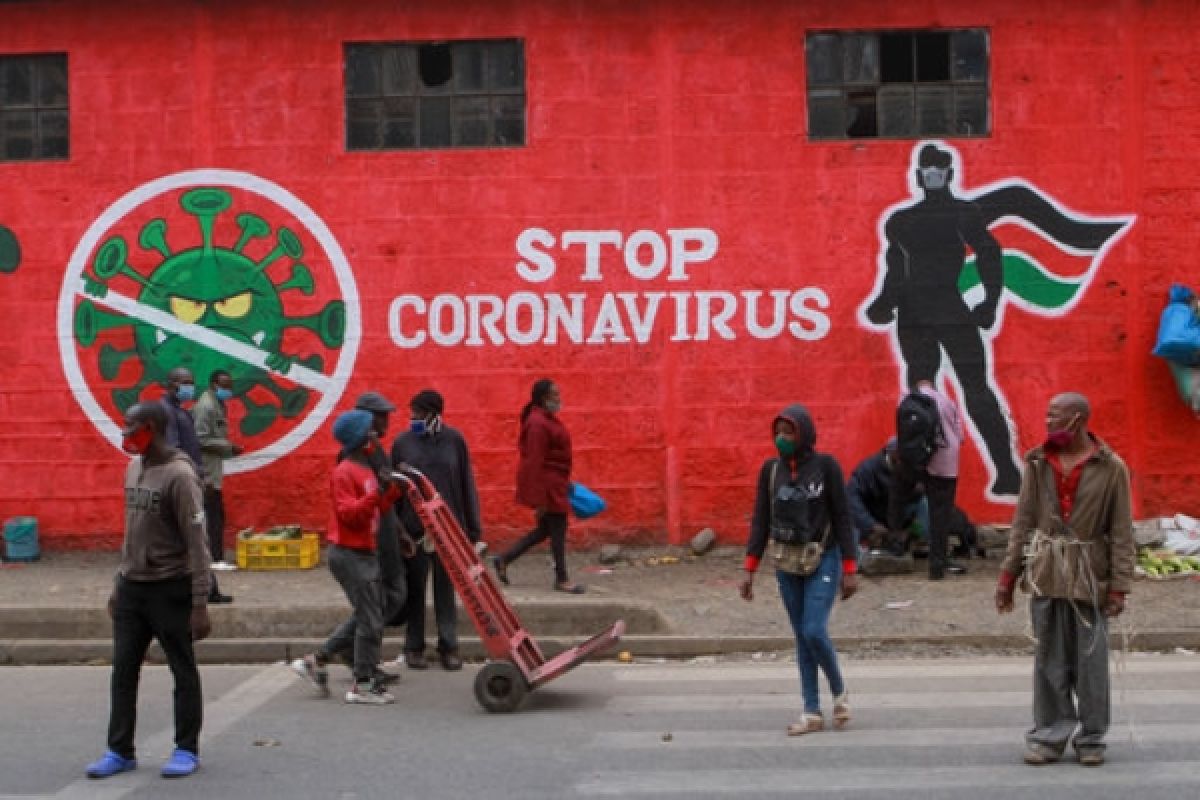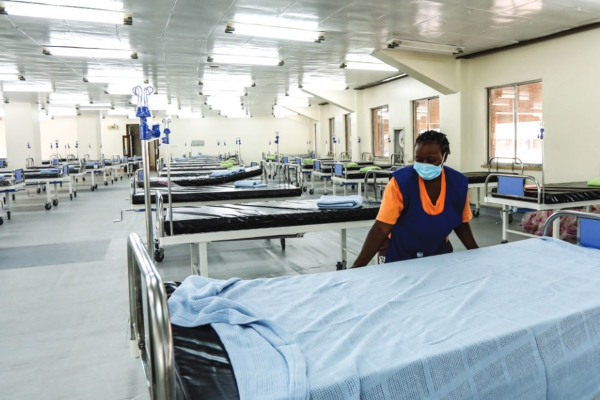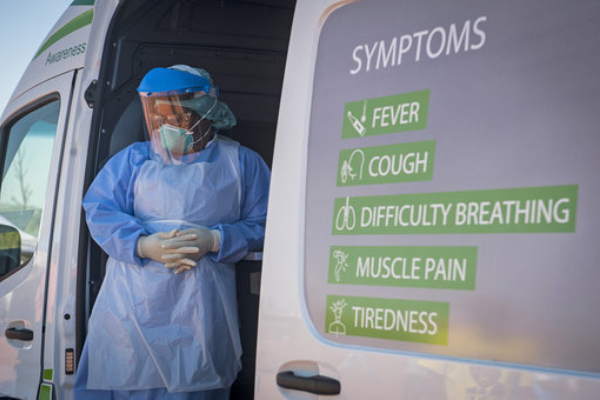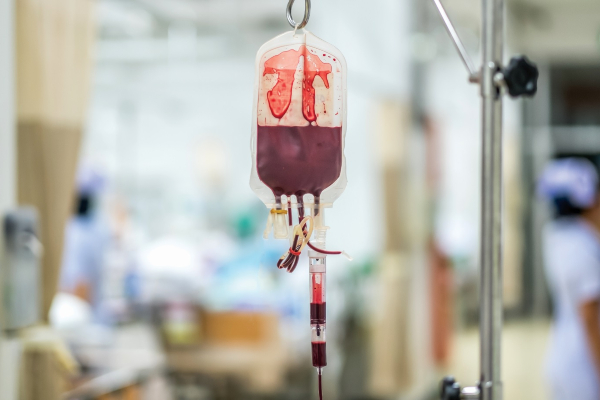Has Africa reached herd immunity?

With early antibody tests revealing the virus may have infected millions more Africans than first thought, Andrea Dijkstra speaks to some of the world’s leading experts and asks whether the fall in hospitalisations and deaths may mean herd immunity is well within reach.
Early this year, experts estimated that the African continent would be especially hard hit by the pandemic, with high rates of transmission that could quickly overwhelm health care systems.
‘Between 300,000 and 3.3 million African people could die as a direct result of Covid-19,’ the United Nations Economic Commission for Africa (UNECA) predicted in April.
The organisation emphasised that sub-Saharan Africa would be particularly susceptible because 56 per cent of the urban population is concentrated in overcrowded and poorly serviced slum dwellings, and only 34 per cent of the households have access to basic hand-washing facilities.
‘When I heard that corona reached Kenya, I feared the worst,’ recalled ICU-nurse Francisca Mumbua, who works at the Covid-19 isolation facility of Machakos Referral Hospital in central Kenya.
‘On the TV, we saw people dying in large numbers in western countries like Italy. I thought that our continent would be hard hit with masses losing their lives, as most of our countries are poor and our healthcare systems are limited. We basically expected to be really overwhelmed.’
Nine months later, and Africa seems to have weathered the pandemic relatively well so far, with just one confirmed case for every thousand people and a little over 35,000 deaths – 3.5 per cent of the global total.
Even South Africa, the hardest-hit country on the continent, has seen a relatively ‘low’ number of deaths, with about 28 fatalities per 100,000 population, compared to 61 deaths per 100,000 in the United States, for example.
‘To our surprise, most of the people who suffered from Covid-19 had a very mild or asymptomatic form of the disease,’ said nurse Francisca Mumbea.
‘Other moderate cases were managed successfully despite the resource challenges faced by most of the African countries.’
According to the World Health Organization (WHO), more than 80 per cent of coronavirus cases in African countries were asymptomatic versus around 40 per cent in Europe.
‘There are simply not so many people in Africa dying from this virus as we see in, for example, Europe’, said Professor Yap Boum, an epidemiologist and microbiologist with Epicenter Africa, the research arm of Médecins Sans Frontières (MSF).
Africa’s youthful demographics are definitely an important reason for the lower death rates, according to most experts.
The median population age in Africa is 19.7 versus 38.6 years in the US and 42.6 in Europe.
In Kenya, for example, half of the population is younger than 20, and only four per cent are 60 or above.
Meanwhile, in Italy, 29 per cent of people are aged 60 or over while only 18 per cent are aged under 20.
Another difference is that coronavirus has also predominantly affected cities, which in Africa are home to younger people.
‘When people retire, they often go back to the village,’ explained Boum, who believed that this natural separation between generations might have helped to curb the virus in some African states.
However, demographics cannot get all the credit for the continent’s successes. Africa’s youthfulness should have resulted in death rates being four times lower than Europe or the United States, according to a recent study called ‘Covid-19 in Africa: Dampening the storm?’.
The death rate is actually around 40 times lower than Europe and the US.

According to the Kenyan pathologist Anne Barasa, a difference in genetics between Caucasians and people of African descent could explain the discrepancy.
‘We could have some differences in some of the genes that are associated with either the expression of receptors that the virus uses to enter our cells, or genes associated with an immune response against the virus thereby giving us a better protective response,’ stated the scientist from the University of Nairobi.
In the United States, however, African-Americans were especially hard hit by the virus and accounted for a disproportionate number of Covid-19 deaths.
This apparent discrepancy might be explained away by recent research from the Boston University School of Medicine, which discovered that patients living in predominantly African-American and Hispanic areas were more likely to be vitamin-D deficient, which put them at a higher risk of acquiring the infection.
A growing number of experts also believe that another important factor is the types of pathogens – or viruses – that people are exposed to, which are often connected to the climate and the levels of hygiene.
‘One good example is malaria that you don’t find in Europe and the United States. In sub-Saharan Africa we are permanently exposed to malaria, typhoid, as well as other coronaviruses, which at some point might build our immunity,’ explained epidemiologist Yap Boum.
‘This might make us more equipped to respond to this new Covid-19 virus. And while people in Europe and the United States also have the flu and quite a number of viruses, many people live in more hygienic environments where they are less exposed to those pathogens.’
Such a view isn’t universally popular. Professor Salim Abdool Karim – widely seen as a leading voice on the pandemic response in South Africa – pointed to other areas of the world with similarly crowded slums that have been hard hit by Covid-19. ‘If this was the case, then why do we see such severe cases in India and Brazil?’
Potential underreporting of Covid-19–associated deaths has also been bandied around. However, to date, African countries have not reported acute health emergencies.
‘We haven’t really surveyed all deaths to determine whether or not there was possible Covid-involvement,’ said the Kenyan pathologist Anne Barasa, ‘although we haven’t had many unexplained deaths.’

The WHO acknowledged that coronavirus deaths might be under-reported in the continent but didn’t suspect a huge gap.
‘Although cases are being missed,’ WHO Regional Director for Africa Dr Matshidiso Moeti said at a virtual media briefing recently.
‘We are not seeing evidence of excess mortality due to Covid-19 or missing deaths.’
Crucially, small antibody surveys suggest far more Africans might have already been infected with the coronavirus than official infection rates suggest, which makes the lower death rates even more striking.
Immunologists from the Wellcome Trust Research Programme at the Kenya Medical Research Institute (KEMRI) in Kilifi, for example, tested 3,174 blood donors from around the country between the end of April and the middle of June, and found that 5.6 per cent of all the donors and 9.5 per cent of those based in Nairobi had Covid-19 antibodies – proteins the body makes when the infection occurs.
‘The results suggest [that] about one in 20 people aged 15-64 years have been exposed to SARS-CoV-2, which is in sharp contrast with the very small numbers of Covid-19 cases and deaths reported during the same period,’ wrote the authors of the paper, which has not yet gone through peer review and was published as a pre-print in July.
If the survey’s results accurately reflected Kenya’s overall infection rate, then 2.5 million Kenyans would have had coronavirus in that period.
Such a high number of infections should have resulted in around 12,500 deaths using the World Health Organization’s conservative estimate of a 0.5 per cent morbidity rate. And yet, by midway through the survey, Kenya had only reported 71 deaths from coronavirus - far lower than the number of deaths reported globally in countries with similar levels of antibodies. Even by the end of September the country had reported only 700 deaths from Covid-19.
Other antibody studies in Africa have shown similarly surprising findings.
Two recent surveys done by the National Health Institute in Mozambique on around 10,000 people from the north-eastern cities of Nampula and Pemba found antibodies to the virus in five per cent and 2.5 per cent of participants respectively.
Mozambique has recorded just 58 Covid-19 related deaths.
Researchers in neighbouring Malawi – where a lockdown was ruled unconstitutional, and the virus thus spread largely unchecked – found similar results.
They tested 500 asymptomatic health care workers in the southern city of Blantyre and concluded that 12.3 per cent of them had been exposed to the coronavirus.
Immunologist Kondwani Jambo, of the Malawi-Liverpool Wellcome Trust Clinical Research Programme, who conducted the study, said: ‘Although health care workers are at higher risk to be infected, the outcomes do tell us that more people have been infected than estimated and the trajectory of the epidemic [in Malawi] is different from Europe, China and the Americas.’
Such a hypothesis might go some way to explaining a study among people who visited public health facilities for antenatal care and routine HIV tests in the Cape Town area. It found that 40 per cent of respondents had antibodies against Covid-19.
The researchers stressed that the results are preliminary and based on a skewed sample of 2,700 people, who aren’t representative of the overall population.
Still, the South African study suggested that ‘especially in poorer communities, a relatively high proportion of people has been exposed to and infected with Covid-19,’ according to Mary-Ann Davies, director of the Centre for Infectious Disease Epidemiology and Research at the University of Cape Town.

Professor Yap Boum said that he also found a high prevalence of Covid-19 antibodies in people from Cameroon. ‘During mobile screenings in [the capital] Yaoundé, we tested 3,000 random people and around 16 per cent already had antibodies.’
The regional representative for Epicenter Africa said that we have to be very careful with these smaller, not peer reviewed test cases, but added: ‘The results definitely tell us that more people have already had the virus than we found through regular Covid-19 testing. We have missed a large group of people, probably because they were not sick.’
Meanwhile, more and more experts have argued that these antibody studies are undercounting the number of people who have had the virus.
A team led by the Biostatistics Unit at Cambridge University’s School of Clinical Medicine argued, for example, that many of the antibody tests used in studies miss out mild cases where people have overcome the disease by producing low levels of antibodies.
Most of the surveys only look for two types of dominant antibodies – Immunoglobulin G (IgG) and Immunoglobulin M (IgM) – but fail to look out for another antibody, IgA, which often acts as the body’s first line of defence against viruses and bacteria.
A study in Luxembourg, for example, discovered more than five times as many people had IgA antibodies than IgG antibodies.
While researchers in the Austrian ski resort of Ischgl found that a staggering 42.4 per cent of the population tested positive for antibodies when they added IgA testing to the mix.
In June, a paper by Sweden’s Karolinska Institute suggested another way in which antibody tests may have been undercounting the number of people who have had the virus.
They found that many people showed an immunological response to Covid-19 in their so-called ‘T-cells’ – another part of the body’s immune system – without necessarily showing antibodies in their blood.
‘No single test can identify all individuals that have been infected by SARS-CoV-2,’ the immunologist Jambo acknowledged.
‘The IgG-based tests, like any other single test, underestimate the true proportion of the population that has had Covid-19, but they give you a minimum estimate useful for tracking the trajectory of the epidemic.’
Sunetra Gupta, a professor of theoretical epidemiology at Oxford University in the UK, acknowledged that some of these tests might have seriously underestimated the number of people who have been exposed to the virus.
She said: ‘Therefore, IgA tests in saliva are now being trialled. However, it’s very difficult and expensive to test for T-cells.’
In even more positive news, some scientists are even starting to argue that the fall in hospitalisations and deaths across the continent might be because Africa is already nearing ‘herd immunity’ – the idea that so many people have already caught the virus that there are not enough uninfected people for them to pass it on to, causing the virus to largely die out.
‘In a few important case studies – Kenya, for example – what seems to be happening is the epidemic may be peaking earlier than our naive models predicted,’ Professor Francesco Checchi, a specialist in epidemiology at the London School of Hygiene and Tropical Medicine, told The Guardian.
He said a similar pattern had emerged in Yemen, where little was done to control Covid-19 because of the ongoing conflict there.
‘Yemen is one of the few countries where, to my knowledge, there is almost no prevention of Covid transmission,’ Checchi told the British newspaper.
‘The anecdotal reports we’re getting inside Yemen are pretty consistent that the epidemic has [...] passed. There was a peak in May, June across Yemen, where hospitalisation facilities were being overwhelmed.’
He added that this is no longer the case and concluded that, ‘it was possible that the population had accrued some sort of ‘herd immunity’, at least temporarily.’
Some experts argue that something similar is happening in parts of Africa where falling case numbers are not because the lockdowns were so successful, but rather they were so unsuccessful the virus spread like wildfire.
In many areas, like urban slums, lockdowns proved almost impossible to enforce, meaning large number of people might have already been exposed.
‘I won’t say that a full country already managed to reach herd immunity,’ Yap Boum told NewsAfrica.
‘But in some specific clusters, 60 per cent of the people might have been already exposed [to the virus].’
The epidemiologist singled out Kenya as an example, where about 56 per cent of the population lives in urban slums.
‘Although the Kenyan government imposed a lockdown, over half of Kenyans didn’t have the possibility to lockdown as they are living in overcrowded informal settlements.
‘They are sharing one toilet with hundreds of people, they live with many family members in a single bedroom house, have to move around through narrow alleys, and often don’t wear facemasks as they don’t feel the burden of the disease so much.’
He added the seroprevalence – or antibody results – will definitely be ‘high in these areas’, and said that he believed this might be the reason that infection rates are going down in Kenya.
He continued: ‘In Cameroon, where we were not having any lockdown, and only bars were closed, infection cases are going down probably because many people already got the virus.’
However, some experts believe that the drop in Covid-19 cases in countries like Kenya and Cameroon should be treated with great caution as they might be connected to a decline in people getting tests.
In Kenya, for example, the number of tests performed per 10,000 people halved between August and September.
‘This decline closely mirrors trends for Nairobi and Mombasa counties but potentially may mask the national picture, as other counties are experiencing increasing case numbers,’ the WHO stated recently.
A change in testing policy in South Africa could also have had an effect on the numbers of new cases, according to the WHO.
‘The country’s current policy of testing only those who present with symptoms makes full interpretation of case numbers difficult.’
More antibody surveys may help show the full picture. South Africa has recently initiated a national seroprevalence survey among over 30,000 people.
Meanwhile, a French-funded study is currently testing thousands for antibodies in Benin, Cameroon, Democratic Republic of the Congo, Ghana, Guinea and Senegal.
The Africa Centres for Disease Control and Prevention has also started administering coronavirus antibody tests in Cameroon, Morocco, Nigeria, Sierra Leone, Zambia and Zimbabwe.
And 13 labs in 11 African countries are participating in a global antibody survey coordinated by the WHO.
Government scientists often claim herd immunity will only be achieved when 60 per cent of a population have been infected, however many top immunologists dispute these widely reported claims.
It is more likely, a team from the Liverpool School of Tropical Medicine argued, that the true figure lies between 10 and 20 per cent.
The 60 per cent figure is based on the idea that we are all equally likely to contract the virus. In reality, according to the team’s leader, Gabriela Gomes, there is a wide variation in an individual’s susceptibility to becoming infected.
This view was echoed by Dr Saad Omer, director of the Yale Institute for Global Health, who told the New York Times: ‘Herd immunity could vary from group to group, and subpopulation to subpopulation, and even by postal codes.’
The virus is thought to spread slowly in suburban and rural areas, where people live far apart, but rips through cities and households thick with people.
This became clear when researchers conducted a random antibody survey among households in the Indian city of Mumbai (Bombay).
They found a startling disparity between the city’s poorest neighbourhoods and its more affluent enclaves. Between 51 and 58 per cent of residents in poor areas had antibodies, versus 11 to 17 per cent elsewhere in the city.
Furthermore, a neighbourhood of older people may have little contact with others but succumb to the virus quickly when they encounter it, whereas teenagers may bequeath the virus to dozens of friends and yet stay healthy themselves.
In the antibody study in Mozambique, the researchers noted a huge differentiation between people with different professions.
Ten per cent of the market vendors in Nampula had antibodies in their blood, while this was only the case with three per cent of bus and minibus drivers.
Once such real-world variations in density and demographics are accounted for, the estimates for herd immunity might fall.
Other scientists warn that you cannot talk about herd immunity unless you’re 100 per cent sure that someone who has had the disease is going to be protected from contracting it again.
Recently, there were at least four separate cases of people who were re-infected with Covid-19 after they had earlier been infected, in Hong Kong, the Netherlands, Belgium and the United States.
‘Until we confirm that exposure to SARS-CoV-2 measured by antibodies is protective, we can’t really claim to be close to achieving herd immunity,’ the Malawian immunologist Jambo cautioned.
Other experts warned that cases in Africa might start to rise again, as many countries have only just started to loosen strict protective measures.
‘It’s too early to tell whether we are heading towards herd immunity, at least in Kenya, as we haven’t opened up completely,’ said the Kenyan pathologist Anne Barasa.
Her view was echoed by Professor Salim Abdool Karim, who said: ‘If we look at the data, close to 120 countries worldwide have completed their first wave of the pandemic, over half of them have also had a second wave.’
Such a pessimistic outlook, however, isn’t shared across the board.
Many scientists point to countries like Sweden, which unlike the rest of Europe didn’t lock down, and now isn’t experiencing a large so-called ‘second wave’, like the rest of the continent. The virus there peaked without a lockdown, and the country has experienced few hospitalisations and deaths in recent months.
Cameroonian epidemiologist Yap Boum admitted that it’s extremely hard to predict if Africa will suffer from a second wave.
He said: ‘While being cautious, I do think that if tens of millions of Africans have already been infected, this raises the questions of whether the continent should try for herd immunity.’
He pointed out that it will take time before a vaccine against Covid-19 will become available – assuming one is ever developed – and said African countries would not be the first to get it.
Meanwhile, measures to control the pandemic, like lockdowns, have crippled economies and could harm public health more in the long run.
In a recent WHO survey of 41 countries in sub-Saharan Africa, 22 per cent of countries reported that only emergency inpatient care for chronic conditions was available, while 37 per cent of countries reported that outpatient care was limited due to the pandemic.
With economies in ruins, and herd immunity potentially much closer than first thought, Yap Boum thinks Africa needs to stop mimicking the West.
‘We need to be careful,’ concluded the epidemiologist.
‘But we also might need to be courageous.’
Update - August 2021: What is causing Africa's increase in cases post vaccination? Click to read.



